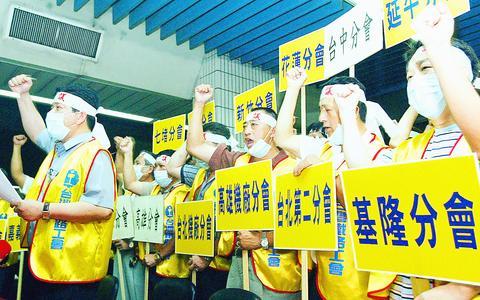The Taiwan Railway Labor Union (TRLU) yesterday vowed to launch a massive members' conference on Sept. 11 to protest what it says is the government's sacrificing of the 115-year-old railway enterprise to the benefit of the nation's north-south high-speed railway.
Sept. 11 is the date of the Mid-Autumn Festival and the union called for travelers to use other means of transportation to return home for the holiday, so that the union's move would not affect them.

PHOTO: CNA
Union chairman Chang Wen-cheng (張文正) said that about 14,000 railway workers will attend the September conference to discuss a strike during next year's Lunar New Year holidays.
As a significant number of railway workers will be attending the conference, the union apologized to the public yesterday for the inconvenience it may cause them.
Some trains are expected to be cancelled because of the high number of railway workers that will take leave to join the conference.
"We decided to do so because we had no other choice. We have the right to seek a way to survive," the union said.
Union members gathered on a platform at the Taipei Railway Station yesterday afternoon to announce their decision.
The traditional railway system under the Taiwan Railway Administration (TRA) faces two grave challenges: settling its disputes with the Taiwan High Speed Rail Corp (THSRC) and the government's plan to turn the TRA into a corporation.
The union's grievances against the THSRC, the company constructing the north-south railway, first emerged when the government asked the TRA to share Taipei Railway Station's platforms, tracks and tunnels with the THSRC.
The union alleged that the Ministry of Transportation and Communications apparently favored the THSRC when negotiating between the TRA and the THSRC about the distribution of Taipei Railway Station's platforms and tracks.
TRA deputy director Hsu Ta-wen (
"If the government can manage to meet the union's demands, its members will not need to hold the conference in September," was Hu's only response.
Viewing the completion of the high-speed railway as a serious threat to the survival of the traditional railway system, the union has launched a number of protests over the past three years, all without avail.
The high-speed railway, with its trains designed to travel at a speed of more than 300kph, will effectively cut the traveling time between Taipei and Kaohsiung to 90 minutes.
In contrast, the fastest trains currently provided by the TRA take at least four to five hours to travel between the two cities.
The union said workers of the deficit-burdened traditional railway enterprise are facing job losses because the government plans to revitalize the traditional railway, partly by axing jobs and reducing salaries.
Accusing the government of ignoring their pleas to secure proper operation of the traditional railway while the high-speed railway is under construction, the union has been staging protests against construction of the new railway since 2001.

A magnitude 4.9 earthquake struck off Tainan at 11:47am today, the Central Weather Administration (CWA) said. The hypocenter was 32.3km northeast of Tainan City Hall at a depth of 7.3km, CWA data showed. The intensity of the quake, which gauges the actual effect of a seismic event, measured 4 in Tainan and Chiayi County on Taiwan's seven-tier intensity scale, the data showed. The quake had an intensity of 3 in Chiayi City and County, and Yunlin County, while it was measured as 2 in Kaohsiung, Nantou County, Changhua County, Taitung County and offshore Penghu County, the data showed. There were no immediate reports of

Weather conditions across Taiwan are expected to remain stable today, but cloudy to rainy skies are expected from tomorrow onward due to increasing moisture in the atmosphere, according to the Central Weather Administration (CWA). Daytime highs today are expected to hit 25-27°C in western Taiwan and 22-24°C in the eastern counties of Yilan, Hualien, and Taitung, data on the CWA website indicated. After sunset, temperatures could drop to 16-17°C in most parts of Taiwan. For tomorrow, precipitation is likely in northern Taiwan as a cloud system moves in from China. Daytime temperatures are expected to hover around 25°C, the CWA said. Starting Monday, areas

The Chinese Nationalist Party (KMT) is maintaining close ties with Beijing, the Democratic Progressive Party (DPP) said yesterday, hours after a new round of Chinese military drills in the Taiwan Strait began. Political parties in a democracy have a responsibility to be loyal to the nation and defend its sovereignty, DPP spokesman Justin Wu (吳崢) told a news conference in Taipei. His comments came hours after Beijing announced via Chinese state media that the Chinese People’s Liberation Army’s Eastern Theater Command was holding large-scale drills simulating a multi-pronged attack on Taiwan. Contrary to the KMT’s claims that it is staunchly anti-communist, KMT Deputy

RESPONSE: The government would investigate incidents of Taiwanese entertainers in China promoting CCP propaganda online in contravention of the law, the source said Taiwanese entertainers living in China who are found to have contravened cross-strait regulations or collaborated with the Chinese Communist Party (CCP) could be subject to fines, a source said on Sunday. Several Taiwanese entertainers have posted on the social media platform Sina Weibo saying that Taiwan “must be returned” to China, and sharing news articles from Chinese state media. In response, the Mainland Affairs Council (MAC) has asked the Ministry of Culture to investigate whether the entertainers had contravened any laws, and asked for them to be questioned upon their return to Taiwan, an official familiar with the matter said. To curb repeated